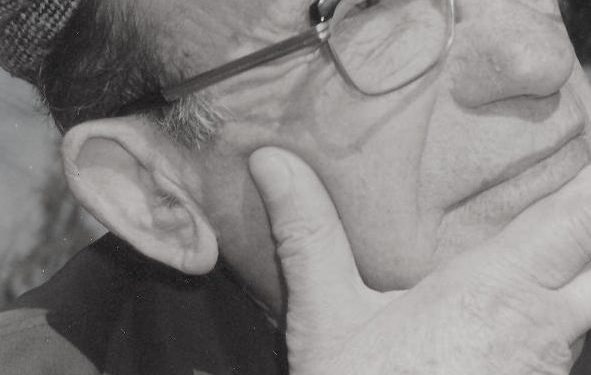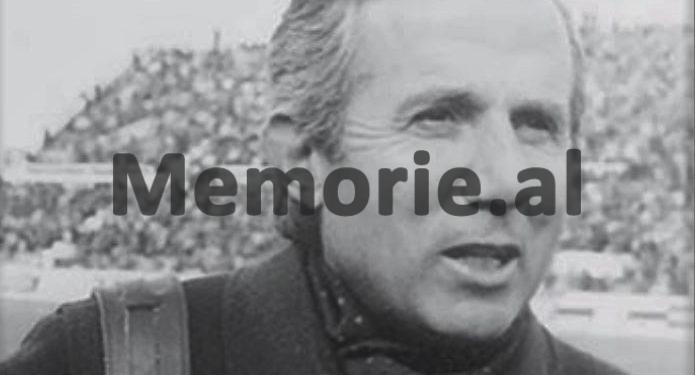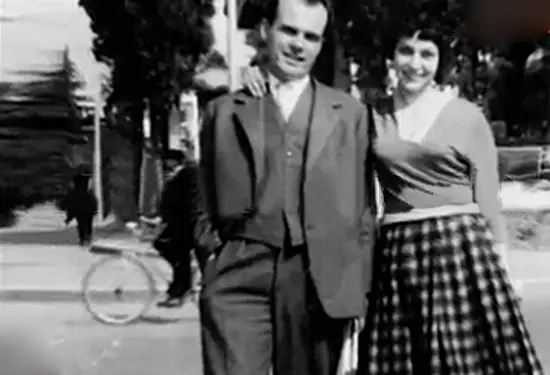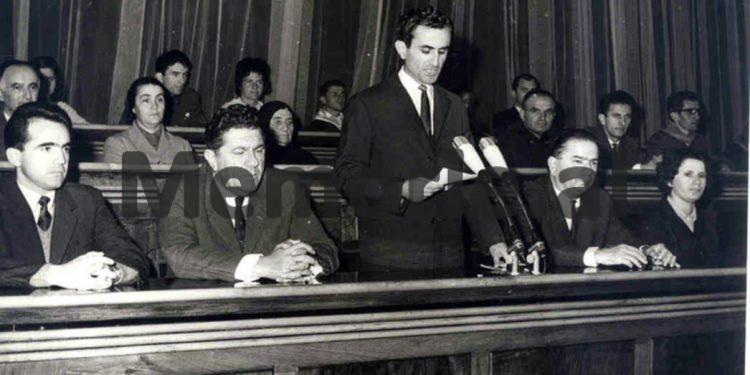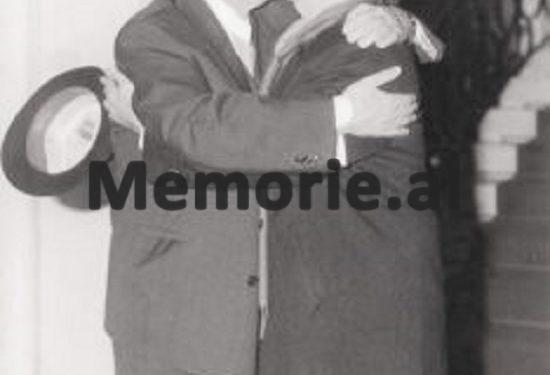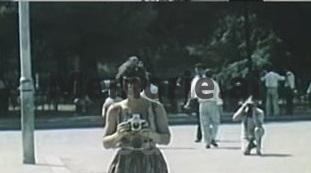From Skifter Kelliçi
The fourth part
Prologue
Memorie.al / It are the fourth time that I am writing about the 11th National Song Festival on Albanian Radio Television, (December 22-25, 1972), as much as I wrote some time ago about the Tirana Conference, (16- April 20, 1956). And this time for the same reason: for the lack of historical accuracy of some events related to this festival, which Ramiz Alia, the former first secretary of PPSh, after the death of Enver Hoxha, describes in the book his last “My Life” (2010), although there are objective, honest statements in it, especially when he testifies about the serious mistakes that led to the failure of the communist system in Albania, led by Enver Hoxha, for which he apologizes. But in the description of his figure, Ramiz Alia is often contradictory, especially in the chapter; “The fight against liberalism”, where it stops at the 11th Song Festival on Albanian Radio and Television (December 22-25, 1972).
Continues from last issue
Todi Lubonja’s birthday
February 5, 1973 came again, the day that coincided with the 50th anniversary of the birth of Todi Lubonja. Meanwhile, on January 23, a letter from a group of young people from Lushnja was published in the newspaper “Zëri i Rinija”, who; “…just like all the youth of our country, they expressed their right reaction and criticized the foreign liberal and modernist shows that were noticed at the 11th Song Festival on Radio and Television”.
(Enver Hoxha, Work 50, notes, page 8, 1986). So, for the first time, these young people used such terms as; liberal modernist, that the dictator himself had not yet used, in the discussion held in the Presidium of the People’s Assembly!
– That letter and the others that followed later in the newspaper, “Voice of Youth”, – Todi Lubonja told me one day, – were concocted from “above”, to show that; “Look, it’s not us, but the broad masses of youth, who sharpen our vigilance, who draw our attention to what happened with the festival in RTS, so we are also getting ahead of the bad things that can endanger us “.
Really, if the lush young people and then the others who wrote those letters were so outraged by the liberal and modernist phenomena they saw at the 11th Festival, why did they wait… a month or more to discuss and jointly send those letters, (and then in the evening, do the opposite – follow the Italian and Yugoslav liberal-modernist music programs with fabricated antennas), when they could have sent them, when this festival had just ended? !
Who prevented them?
Even today, 49 years after the development of the festival, some of these young people who must be 65-75 years old, if they have the civic courage, can confess the source of those letters, which they were forced to write under dictation, therefore, they openly say the bitter and tragic-comic truth. In fact, Todi Lubonja did not pay attention to those letters; he did not organize any meeting, at least with the employees of the music sector, where the opinions of these young people, expressed in them, could be analyzed. In addition, he did not send a self-critical reply to the newspaper “Zëri i Rinija”, apologizing for the serious critical remarks they made.
(And, even if only for the sake of the eyes, he should have done this, because that’s what the dictator wanted). But, on the other hand, not RTS employees anymore, but no communists, after the festival, raised their voice and even more so, did not react to the letters in question. It was never expected that after those letters, Enver Hoxha would undertake an invisible storm, with such shocking consequences.
But let’s go back to Todi Lubonja’s birthday. What is the truth, to celebrate it, there was no collective meeting. But, in the waiting room of the Television, that morning, warmly welcomed by RTS leaders, we saw the member of the Political Bureau and the deputy chairman of the Council of Ministers, Adil Çarçan, the member of the Central Committee and the rector of the University of Tirana enter. Agim Meron, and the well-known writer, Ismail Kadare, (the latter two close friends of Todi).
After a warm conversation, Adil Çarçani, on behalf of the Central Committee of PPSh and the Council of Ministers, decorated Todi Lubonja with an important order, which, unfortunately, I do not remember. Adil Çarçani also read the motivation accompanying this decoration. Then, when I was writing the book, “The History of Albanian Radio-Television”, (1938-1990)”, I read this motivation, which was published in the magazine, “Tribuna e Gazetarit”, no. 1, 1972. As far as I remember, Todi Lubonja was valued as an indomitable fighter, in the consistent implementation of the Party’s line in the tasks assigned to him, since the liberation of the country, as an outstanding leader on the ideological front…!
Was this high decoration given without the knowledge of Enver Hoxha?! Had he not read this motivation, from a compact page, for this “loyal son of the party”, whom, then, before two months had passed, he would declare an enemy?! Impossible! This is how far the infidelity and madness of this monster reached. Wasn’t Todi Lubonja right now to be calm, even more so when, as he told me, during the meetings with him that afternoon, with the exception of Enver Hoxha, almost everyone came to congratulate him in the apartment where he lived all members of the Politburo, of course, including his childhood and war friend, Ramiz Alia!
Another fact: At the end of February, always in 1973, the talented journalist, Petro Lati, had written the scenario of a sports competition, in which teams from the eight-year schools of Tirana would participate. He asked me to direct him. I did not accept. First, that I didn’t like dealing with children and, secondly, that by directing the “Sports Column”, while also presenting sports news in “Revista Television”, I would probably become boring for the TV viewers. But Todi Lubonja himself insisted that I be the leader of this competition. He even called me to the office. I explained that… I didn’t have any fancy dress to wear for the occasion. “Wear Bujar Kapexhiu’s sports jacket, with which he appeared at the 11th Festival”, he said laughing and slapped my shoulders. And so it was.
(Another thing, since the beginning of April, when Todi Lubonja, as we will see, had left RTSh, and the competition had started to be broadcast on television, two letters arrived, which pointed out that “I resembled the television commentators Italians and, to make matters worse, the commentators…Yugoslavs”, which angered the leaders of RTS, so much so that they wanted to stop this competition, which was being followed with interest by adults as well. Only an intervention from above saved it that.)
Vicious circle
On the evening of March 7, the match between “Bayern” and “Ajax”, the quarter-final of the European Champions Cup, would be played in Munich. But that same afternoon, for the Balkan Cup, in Elbasan, the local “Labinoti” would face “Budusnocti” from Titograd, (today Podgorica). This match was broadcast live on the Radio, while TVSh would broadcast it recorded in the evening. There would, therefore, be collisions. Those of the TV programming, to be “inside”, wanted to program the match of Elbasan. But who would follow him, when everyone knew the result and when in Munich, Beckenbauer and Cruyff would face each other?!
Then I decided to meet Todd. I knocked on the door and went inside. I saw that he was talking to someone on the phone. I hesitated, but when he, smiling slightly at me, beckoned me in, I did so. “Okay, friend Vito,” he was saying. – This is what we will do; we will send the journalist and cameraman to your office, to do the interview for March 8″. I realized that Todi was talking to Vito Kapo, president of the Women’s Union, and the wife of, no more and no less, Hysni Kapo, number 2 in the party hierarchy.
A conversation followed that seemed warm to me, and when he hung up, he listened attentively to what I told him. He was silent for a while, and then he told me: “You’re right, if we broadcast the “Labinot” match, the viewers will want to watch “Bayern” and “Ajax” from the Italian or Yugoslav stations. So, we broadcast this match and our match, we leave it for tomorrow”. That’s how we parted. In fact, that was the last time I talked to him. He could and should have done the opposite, but even in that situation, he chose the most logical solution.
-“Those days, – Todi told me in one of our meetings, – I had a bad feeling, although Vito Kapo during the conversation, it seemed clear to me. I met with Ramiz Ali. I told him what was going on. He invited me to go to Dajti Mountain. There at the guest house, we drink coffee. He tried to calm me down. “What was going to happen, happened”, he told me. But even he did not know what satanic thoughts were boiling in Enver Hoxha’s burning brain.
But, finally, on March 11, 1973, the newspaper “Zëri i Populli” published a harsh article against the 11th Song Festival in RTSh and probably, by order of Enver Hoxha himself. So, 45 days after the end of the 11th Festival, when this critical article had to be published flame by flame after the festival, just as this newspaper was vigilant, when the interests of the Party required it.
After a few days at the League of Writers and Artists, the discussion of the 11th Festival was organized. The truth is that in the middle of the RTS and in other environments, there had been whispers under the voices of singers and composers about the consequences that this festival would bring. Each, or each, feared that the song he had composed or sung would be targeted.
“I was also in this very heavy state of mind,” the talented singer and actress, Justina Aliaj, told me one day in her home in New York, where she lived for many years. – I had sung the song, “On the TV screen,” by the composer Agron Djunga. The truth is that, to give an even more exciting tone to the rhythm of this song, which was very well received by the viewers, I sang like this: “On the TV screen, / You had gone out with friends and you too…”, thus lengthening the vowel “e”. This “phenomenon” was called a foreign show and I was severely criticized.”
“Musicians, creators of music critics, skilled and failed, – writes Mihal Luarasi, the director of this festival, – mediocrity, miserable scumbags, who were left out of the 11th Festival, unscrupulous careerists, who thought their moment had come, to climb,…they analyzed one by one the songs, the voices, the orchestrations, the interpretations, the singers, the scenography, the maxi skirts, the direction and “scientifically proved” that the Party and Comrade Enver were right. The 11th festival was a national disaster, a nine-point earthquake, a monstrous crime against the people and socialist art.” (“Memory that never sleeps”, page, 207).
And all this… two months and 15 days after the 11th Festival! Why wasn’t it done before?! That they were waiting for orders from above, according to Enver Hoxha’s script. Mihal Luarasi also remembers that after the meeting, Pirro Kondi, member of the Central Committee and director of the Propaganda Directorate, accompanied him in his car to the house and on the way told him calmly that; “Thus, the issue of the 11th Festival would be closed, because Enver Hoxha was taking the trigger from this festival, to strike against foreign shows, which had taken off in some spheres of life…”!
“There are bigger things that stand out and the festival will be forgotten”, he concluded. Just like Ramiz Alia, he had calmed down Todi Lubonja. So, even Pirro Kondi had no idea what satanic plan Enver Hoxha was conjuring up in his evil mind?! And let’s not forget that he was the brother-in-law of Hysni Kapo…! But surely neither he, no. 2, after Enver, he had no idea about this feat of the dictator, because even if he knew, he would not dare to stop his Moroccan revan. And Ramia Alia insists on his book, that… “Enver Hoxha listened to his friends…!? However, the vicious circle for the Festival began to narrow.
“It began,” writes Ramiz Alia in his book “My Life”, – the process against this festival and against foreign displays of modernist tendencies. Criticism erupted from every direction. Naturally, opportunities were created for the sectarian elements to unfold their concepts. From the field of arts, criticism spread to the field of literature and culture, meetings followed one another, both in Radio-Television and the League of Writers, as well as in the university and the Academy of Arts. Everywhere there was some creator who had made a mistake, who had deviated from the party line …”, (page 264). Memorie.al
The next issue follows




